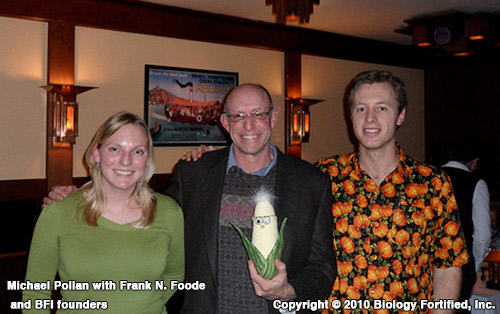FDA and GMO labels
| ||
|
Etiquetas: en, Labeling, Organic Consumers Association
Este es un blog bilingüe fundado en mayo de 2004, dedicado a proveer perspectivas críticas sobre biotecnología y bioseguridad … This is a bilingual blog, founded in May 2004, dedicated to providing critical perspectives on biotechnology and biosafety. Contact: ruiz@tutanota.com.
| ||
|
Etiquetas: en, Labeling, Organic Consumers Association
"The science behind genetically engineered foods is complicated, and often difficult for people to understand. Some people who think that these foods are strange, dangerous, or monstrous call them 'frankenfoods' rather than try to understand them. At the same time many other foods that we commonly eat are themselves very strange in their own right -- often even more strange than the changes made through genetic engineering. So we named our mascot Frank N. Foode™ to make light of it all! Our hope is that this fun character can help get people interested to learn and think about the issues surrounding plant genetics and agriculture, and give people a personality who they can follow around the world."
 While there are undoubtedly those who call GMOs "frankenfoods," many critics focus on the "pesticide treadmill" that the most commonly grown and sold GMOs -- "Roundup Ready" herbicide-resistant crops and those with the pesticide Bt built in -- perpetuate, as CMD has reported. This critique appears to have only been addressed in passing by the Biofortifiedblog, which simply notes that the issue of pesticide proliferation also "applies to non-breeding strategies including chemical insecticides and biological control agents," a point which critics of GMOs also make, as CMD has reported.
While there are undoubtedly those who call GMOs "frankenfoods," many critics focus on the "pesticide treadmill" that the most commonly grown and sold GMOs -- "Roundup Ready" herbicide-resistant crops and those with the pesticide Bt built in -- perpetuate, as CMD has reported. This critique appears to have only been addressed in passing by the Biofortifiedblog, which simply notes that the issue of pesticide proliferation also "applies to non-breeding strategies including chemical insecticides and biological control agents," a point which critics of GMOs also make, as CMD has reported.Etiquetas: Anastasia Bodnar, Center for Media and Democracy, en, Rebecca Wilce
| Publication date: March 04, 2014 Posting date: March 04, 2014 |
THIRD WORLD NETWORK BIOSAFETY INFORMATION SERVICE
A new study published by the journal, Environmental Sciences Europe, examines scientific reports of such occurrences. Important examples are bentgrass, oilseed rape and cotton. The report highlights factors that favor transgene escape; in particular, wild relatives that can cross with the crop plants are a major factor in the unintended spread of the transgenes. The report stresses that there are “significant uncertainties in predicting which transgenes will escape and how they will interact with the environment”. The authors warn that the Precautionary Principle can only be applied where efficient measures to ensure the removal of GM organisms from the environment are available. Otherwise, it will not be possible to mitigate any undesirable effects. Because of the implications of this and the gaps in knowledge, the authors call for stricter regulations to be implemented immediately to reduce the incidence of transgene escape into the environment.
The full article is available at: http://www.enveurope.com/content/25/1/34. The abstract and conclusions are reproduced below.
With best wishes
Third World Network
131 Jalan Macalister
10400 Penang
Malaysia
Email: twnet@po.jaring.my
Website: http://www.biosafety-info.net/ and http://www.twn.my/
|
Etiquetas: Contamination, en
Etiquetas: es, La Jornada, Ribeiro
Etiquetas: es, Puerto Rico

Etiquetas: Bt, Doug Gurian-Sherman, en
| Publication date: March 19, 2014 |
THIRD WORLD NETWORK BIOSAFETY INFORMATION SERVICE
Dear friends and colleagues,
Re: RNAi–based pesticides and GM crops will need special safety testing
A peer-reviewed paper in the journal Bioscience draws attention to potential hazards on nontarget species of pesticides and GMOs made with RNA-interference (RNAi) gene-silencing techniques. The hazards include off-target gene silencing, silencing the target gene in unintended organisms, immune stimulation, and saturation of the RNAi machinery.
The paper, authored by two employees of the US Department of Agriculture Agricultural Research Service, notes that the nature of these new pesticides and GMOs makes the prediction of toxic effects challenging. In addition, the rapid development of RNAi applications has challenged scientists to identify and fill key knowledge gaps that underlie the environmental implications of large-scale, pesticidal RNAi-based crops.
The authors raise the concern that current toxicity testing is inadequate to assess the safety of these new technologies. They therefore suggest the development of a special testing and regulatory framework to assess the safety of such RNAi-based pesticides and GM crops. Other scientists have previously highlighted how regulators have not assessed the safety of these RNAi-based pesticides and GM plants, and have developed and provided a safety testing procedure for such crops and products (See BIS, 25 March 2013: New kinds of GM plants and pesticides not being assessed for safety).
With best wishes,
Third World Network
131 Jalan Macalister
10400 Penang
Malaysia
Email: twnet@po.jaring.my
Website: www.biosafety-info.net and www.twn.my
To unsubscribe: reply ‘unsubscribe’ to news@biosafety-info.net
To subscribe to other TWN information services: www.twnnews.net
Item 1
RNA-interference pesticides will need special safety testing
A new technology for creating pesticides and pest-resistant crops could have effects on beneficial species that current toxicity testing will miss
Press release, American Institute of Biological Sciences, 16 Jul 2013
|
Etiquetas: en, RNAi, Third World Network
Etiquetas: es

Etiquetas: El Nuevo Dia, es, Puerto Rico